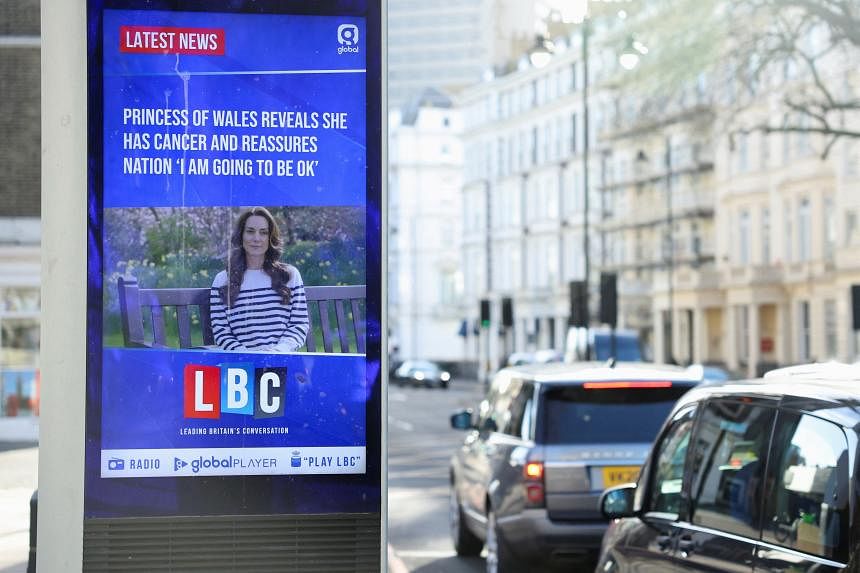SINGAPORE - The cancer diagnosis for Catherine, Princess of Wales, has brought to light the troubling rise in certain cancers globally among people under 50.
Cancer experts in Singapore say early detection from increased screening may be on the rise, but it is not the case for young-onset cancers, as those under 50 would not have met the age criteria for screening.
Dr Gloria Chan, from the Department of Haematology-Oncology at the National University Cancer Institute, Singapore (NCIS), said the search for the cause of this rising trend in young-onset cancers worldwide is still ongoing.
“What is troubling is that a large majority of these young patients do not have an identifiable inherited genetic cause of cancer and are otherwise young and healthy. This has been described as a ‘birth-cohort’ effect – patients who are born in 1990 are four times more likely to develop young-onset colorectal cancer than those born in 1950,” she said.
According to a study published in BMJ Oncology journal, the global incidence of cancer among younger people increased by nearly 80 per cent between 1990 and 2019.
The Singapore Cancer Society’s statistics showed that the incidence of cancer for those under 50 years old increased by 10.4 per cent from the period between 2008 and 2012 to the period between 2017 and 2021. The increase was from 11,416 cases to 12,600.
Dr Lu Wei, a gastroenterologist at Parkway East Hospital, said the global rise in cancer diagnoses among people younger than 50, including women, has been observed over the last 30 years.
“Our data from the Singapore Cancer Registry corroborates this trend, revealing a consistent uptick in the incidence of colorectal, liver, pancreas and stomach cancers among both women and men over the past two decades,” Dr Lu said.
The former Kate Middleton, 42, announced on March 22 that she has cancer and is in the early stages of chemotherapy. The announcement came weeks after King Charles revealed his own cancer diagnosis. In a recorded video statement disclosing her diagnosis, she said the cancer was detected in tests that followed abdominal surgery in January. At the time of the operation, she said, it was believed her condition was not cancerous.
Without speculating on the Princess’ situation, Professor Jimmy So, who heads surgical oncology at NCIS, said that despite advancements in medical imaging and non-invasive diagnostic techniques, screening methods have their limitations in sensitivity and specificity.
“They might not always detect smaller tumours or differentiate between malignant and benign conditions effectively. A definitive diagnosis of cancer, including its type and stage, might only be possible through examination of the disease of tissues obtained during surgery,” he said.
Dr Daniel Huang, a consultant with the Division of Gastroenterology and Hepatology at the National University Hospital, cited a study published in Jama Network in 2023.
“We found that the increase in early-onset cancers was largely related to a surge in cancers among people aged 30 to 39 in the United States. This suggested that increased screening is unlikely to be the main driver of the rising rates of early-onset cancers, as many types of cancer surveillance are not routinely performed in people younger than 50,” he said.
“Screening tools are not perfect. For example, we found that surveillance tools such as ultrasound scans for liver cancer are less sensitive in people with obesity.”
Citing the Ministry of Health’s screening for colon cancer, which starts only for people at the age of 50, Dr Matthew Ng, who heads the Department of Gastrointestinal and Neurological Medical Oncology at the National Cancer Centre Singapore, said that unless those below the age of 50 have inherited syndrome (cancers caused by mutations in certain genes passed from parents to children) and started screening at a much younger age, the cancer is not picked up.
“We do not really know what the current factors are that are driving this trend, but it is likely to be multifactorial, rather than one single factor,” he said.
NCIS’ Dr Chan said: “Data from large-cohort observational studies has identified various risk factors for developing young-onset cancer, including obesity and sedentary lifestyles. Recently, there have been articles linking other environmental exposures to young-onset cancers as well, but these are merely associative factors, and no definitive conclusions about cause can be drawn.”
Dr Ng said: “Nowadays, younger people are also exposed to things like smoking and alcohol and at a younger age than what you would have seen in the past.”
However, he noted that what has been observed in Singapore seems to be a reverse in the rise in gastric and liver cancers.
“The cases have become fewer, and that is partly because of the eradication of Helicobacter pylori (H. pylori) bacteria that infect the stomach, vaccination for hepatitis B, and early screening for liver cancer,” he said.
“Sometimes, even when patients do not have cancer, but depending on the symptoms, they go for tests, which may detect things like hepatitis B or H. pylori. These symptoms are easily treated, which then reduces their risks of developing into cancer in the future.”


